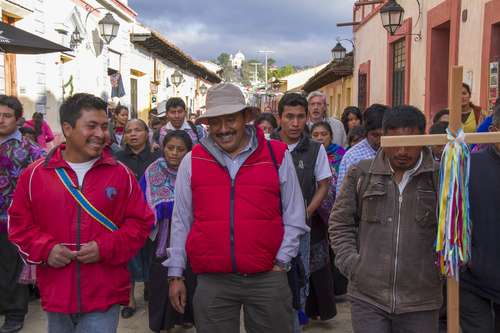 |
| El profesor tzotzil Alberto Patishtán Gómez al arribar ayer a San Cristóbal de las Casas, Chiapas Moysés Zúñiga SantiagoFoto Moysés Zúñiga Santiago |
San Cristóbal de las Casas, Chiapas, November 30,
2013
“The struggle doesn’t end
here. It begins here.” With these words Professor Alberto Patishtán Gómez
arrived in Chiapas, free for the first time in 13 years. Around a hundred
indigenous people received him. They were from the Catholic organization
Pueblo Creyente (Believing People) and from the Movement of the People of
El Bosque, which has demanded the Tzotzil teacher’s freedom for more than a
decade.
After coming from Mexico
City, Patishtán left the Ángel Albino Corzo Airport at 12:30 PM. Representatives
of the communications media surrounded him immediately. Once outside, his people
greeted him with affection; he received the first hugs from his Aunt María, his
grandfather and other family members and neighbours.
In what turns out to be a kind of poetic justice, those who accompanied the professor revealed that during the flight, one seat ahead of Patishtán was the former Chiapas Governor Roberto Albores Guillén, whose government was responsible for the professor’s unjust incarceration in 2000. And although he was the first local governor to promise the population of El Bosque to free him, he never did so. The young president of the state Congress, Luis Fernando Castellanos, was also travelling in the aeroplane. On hearing the exclamations of “¡Viva Patishtán!”, he shouted from his seat: “Patishtán, I was always in favour of your freedom.” The witnesses say that Albores Guillén, uncomfortable and trapped in his seat, “played dead.”
The indigenous who were
guarding him formed a wall and walked with him a few metres to stop and welcome
him properly: embraces, laughs, hugs, blessings, vivas to Tatic Samuel
Ruiz. “May truth live!” and “May injustice die!” Patishtán took the word: “They
always told us that we were disoriented; that this struggle wasn’t worth it, but
justice is worth it, the people need it.” Marcelo Gómez, parish priest of
Simojovel, “baptized” him as “a traveller who defends his people,” and gave him
a cross that was also a staff. The Tzotzil professor said: “We have to transcend
and deepen things to find the key of love. Jesús does not tell you ‘we are going
to walk alone,’ but rather ‘we are going to walk together.’ We should not say to
him ‘take away this problem,’ but rather ‘give us the strength to conquer
it.’”
The indigenous hospitality
came from San Juan Chamula, Zinacantán, Tuxtla Gutiérrez, San Juan del Bosque
and San Cristóbal de las Casas. The airport authorities considered it preferable
for the indigenous to remain outside, arguing that “there wasn’t sufficient
space” for them in the waiting room. Some attendees considered it unacceptable
that the indigenous were prevented from entering a public space where tumultuous
crowds have been seen receiving stars of spectacle and sport, without denying
passage to their fans.
The catechist from Chamula,
Zacario Hernández, ex political prisoner and compañero of Patishtán in the Voice
of El Amate, read the greeting from the Pueblo Creyente for this “encounter with
freedom”: “We came to meet you now that you arrive in your land, in your town,
with your people, as a free man; free of the blame that the powerful imposed on
you, that cost you 13 years, five months and 11 days.”
Afterwards, a caravan of
vehicles accompanied him to San Cristóbal de las Casas. In the afternoon,
Patishtán prayed at the tomb of the Tatic in the cathedral. Then a
welcome mass was held, celebrated together by six priests with the auxiliary
Bishop Enrique Díaz; among them Gonzalo Ituarte, Pedro Arriaga (spokesperson for
the diocese) and the vicar José Avilés.
At one side of the altar,
Professor Patishtán remained flanked by his grandfather and his son Héctor.
Bishop Díaz expressed “the joy of all the believers in the diocese” for his
liberation, and referred to his “unique, emblematic case,” which nevertheless
reflects the situation “of many in prison who have not had the means to obtain
justice.”

No hay comentarios.:
Publicar un comentario